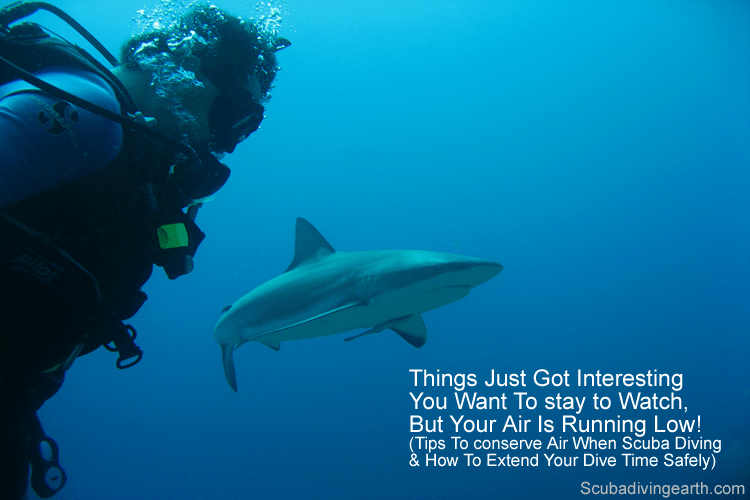
22 tips to use less air when scuba diving – Easy pro techniques to extend your dive time safely
I’m a big guy so I need to know how to conserve air while scuba diving more than most. I’m 6’6″ tall and weigh around 113 kilos (250 lbs). Which makes me 27% larger than an average person. This is why I need to work harder than the average person to conserve my air, as I often dive with the same 12 litre tank as everyone else.
The best way to do more diving and to practice consuming less air when diving, is to book yourself on a scuba diving liveaboard. You can check the latest and best deals on liveaboards using the following window:
Top tips of how to conserve air while scuba diving:
- Wear the correct exposure suit to stay warm.
- Relax and stay calm.
- Check equipment for leaks.
- Use your snorkel on the surface.
- Breathing slowly and deeply.
- Buoyancy control.
- Streamline yourself.
- Swim slowly.
- Choose good fins.
- Exercise.
- Weight yourself correctly.
- Inflate your BCD with your own breath before leaving the boat.
- Control your buoyancy with small air adjustments.
- Be the last diver to leave the surface.
- Don’t empty your BCD completely at the surface.
- Slow your descent as you approach your dive depth.
- Use your lungs for buoyancy.
- Dive shallower than the main group.
- Swim with the current.
- Do more diving.
- Lose a few extra pounds.
- Trim your kit.
Learning how to conserve air while scuba diving is one of the most important techniques to master.
Mastering this will make your air last longer and will extend your dive time. The list of air saving tips I’ve created also includes tips to extend your dive time too.
The context of why my techniques are worth noting for how to conserve air while scuba diving
For context and why I’ve had to master how to conserve air while scuba diving; I’m 27% larger than the average scuba diver. I stand in at 6’6″ tall and weigh 249 lbs!
This means that I’d need to dive with a 15 litre (100 Cubic Foot) dive tank to stand a chance of my air lasting the save time as the average scuba diver.
More Reading: What are scuba tanks made out of (Steel vs aluminium scuba tanks)
However, most places I only dive with the same 12 litre (80 Cubic Foot) dive tank as everyone else. This is why my list is so long. Some you may already know, but some perhaps not. But they work for me, as my air consumption is similar to the average scuba diver, despite being 27% larger.
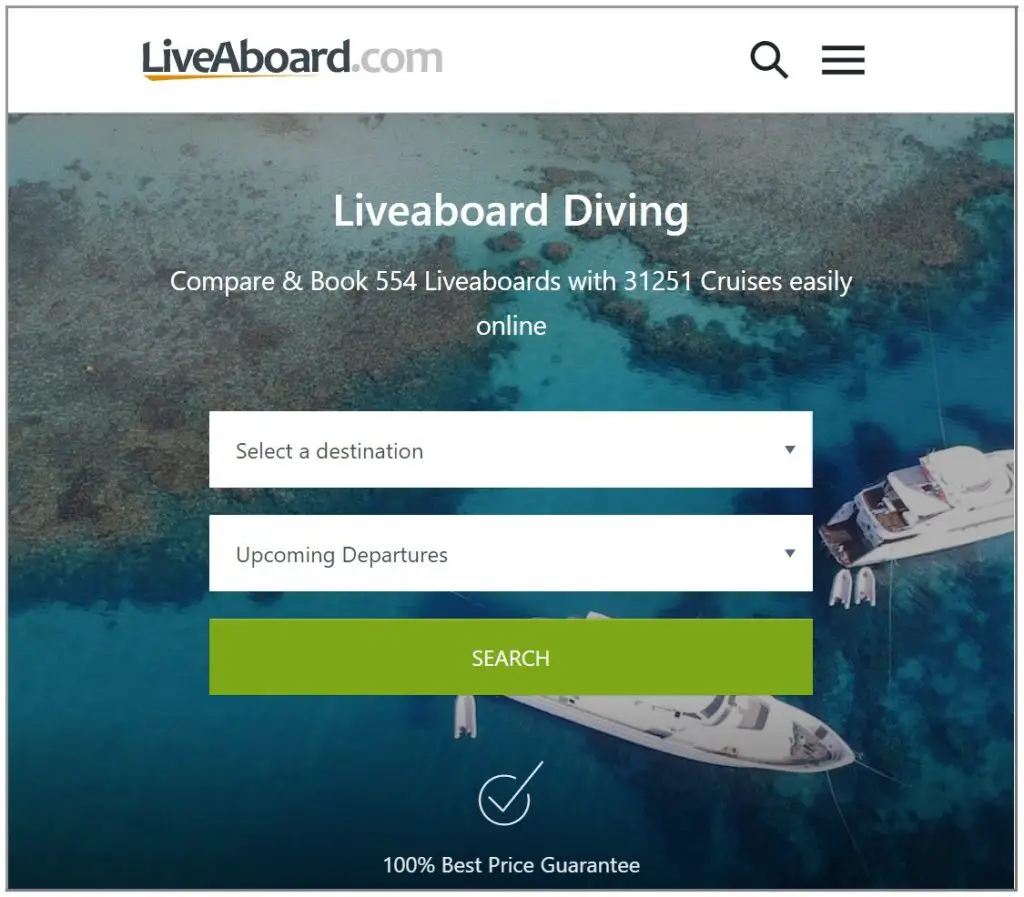
The two main ways in which we consume air when scuba diving:
- The air we breathe.
- The air used to remain neutrally buoyant.
The aim to conserve your air whilst diving is to be as efficient as possible with both forms of air consumption. Which means your air will last longer and the dive time will increase. This results in having more fun diving!
But firstly, let’s take a look at how scuba divers breathe underwater.
How do scuba divers breathe underwater?
Breathing when scuba diving for the majority of divers is achieved by using a standard aqualung. The basic kit for an aqua lung is a diving tank (either 12 or 15 litre (80-100 Cubic Foot)), together with a set of regulators (the bit that connects the air in your tank to your mouth so you can breath).
The air is delivered to your mouth via a mouth piece (the regulator or demand valve (DV)), which supplies air on demand. Hence the name ‘demand valve.’
This means that there’s only a finite amount of air for your dive. So for me, if there’s anyway to conserve air or make my air last longer, then I apply any technique I can to all my dives.
Safe ways to conserving air when scuba diving, where conserving air begins on the boat or on land, before you jump into the water…
22 tips to conserve air when scuba diving used by the pros
1. Wear the correct exposure suit to stay warm will conserve your air when scuba diving
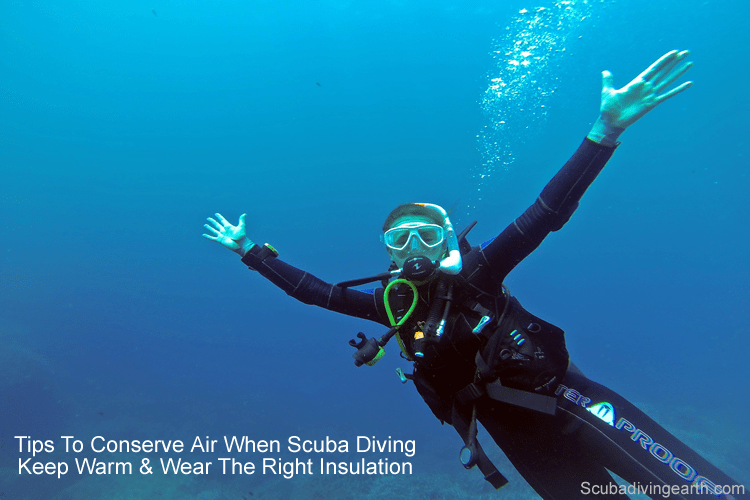
Wearing the correct exposure suit keeps you warm so you conserve air when scuba diving. If you’re cold, your body needs more energy to stay warm. Our bodies consume more oxygen when we burn energy to help create that warmth. The warmer you are the less oxygen is used and the more air is conserved.
To keep warm on a scuba dive you need to wear the correct thickness wetsuit or drysuit in colder waters). Before you dive you should know what the water temperature will be for your diving destination before you arrive. This makes sure you take the correct thickness exposure suit so you are prepared with the aim to conserving your air.
Conclusion for air conservation tip 1: Keep warm when you dive by wearing the correct exposure suit to conserve energy and reduce air consumption.
2. If you relax and stay calm you’ll use less air scuba diving so you to dive for longer
If you stay calm and relaxed on a scuba dive you will use less air scuba diving and be able to dive for longer. Whereas if you’re in a state of anxiety when you dive you’ll use more energy. Which means if you use more energy you’ll breathe more and increase your air consumption, thereby shortening your dive time.
Many beginner scuba divers are nervous when they first start to scuba dive. This means they won’t be relaxed. Any anxious state will result in an increased heart rate, leading to a higher respiration rate. A higher respiration rate leads to a higher consumption of oxygen, and as a consequence you’ll use more air.
Your aim is to reduce your air consumption on your dives, so you need to find ways to help you relax on a dive. The first of which is to enjoy scuba diving rather than fear it. Diving should be fun and exciting. If you change your focus, you’ll alter your state of mind, which in itself can lead to a more relaxed state.
Learning to meditate or use self hypnosis can work well to relax the mind. If you struggle with relaxing on a dive, consider using a hypnotherapist or psychotherapist to help you change your thinking style.
Conclusion for tip 2 to use less air scuba dive: Learning to relax and stay calm when scuba diving will mean your body will use less energy. A body that uses less energy requires less oxygen for respiration. With a reduced respiration rate you will use less air on your dives and extend your dive time as a result.
3. Scuba diving air management includes checking equipment for air leaks
Air leaks in your dive equipment will waste your air. So in order to conserve your air when scuba diving check your equipment for leaks.
Dive kit often develops air leaks. These leaks can include the O-rings on your dive tank, the inflator hose on your BCD and drysuit, or leaks on your regulator. Make sure to check for leaks before you dive.
Also, key scuba diving air management includes making sure you have your dive equipment serviced regularly. This is for your safety and to help prevent air leaks.
Conclusion to conserving air tip 3 and good scuba diving air management: Always check for lair leaks to avoid wasting air via leakage.
4. Use your snorkel on the surface instead of your regulator to conserve your air and dive for longer
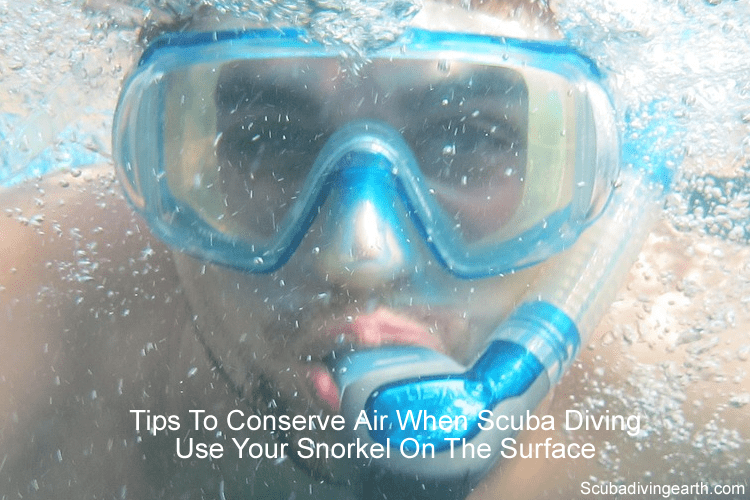
Using your snorkel on the surface instead of your regulator will conserve your air. You should use your snorkel to breathe when you are swimming on the surface, so you don’t reduce the airtime of your dive.
Most divers don’t use their snorkel at the surface, but immediately put their regulator into their mouth instead. But I always use my snorkel, which is permanently attached to my mask.
Using your regulator on the surface instead of your snorkel, whilst waiting for your dive buddies, can waste air and reduce your dive time significantly. This is especially the case in choppy waters and if you have to swim to the shot line or to the front of the boat.
You can sometimes spend 5-10 minutes waiting on the surface for your dive buddies, especially if you’re one of the first in or if there are novice divers on the dive.
If the water is clear so you can see the bottom enjoy the time snorkeling until your buddies arrive. In this time you will often see things whilst you wait. I’ve often seen turtles, sharks and other creatures this way, whilst at the same time conserving my air for the dive itself.
Conclusion for conserving air tip 5: Use your snorkel to swim on the surface so you don’t use your dive tank air until you begin your descent. Thereby saving as much of your air as possible for the dive itself.
5. Breathe slowly and deeply to conserve air and extend your dive time
WARNING: When you control the way you breathe underwater, never hold your breath. Also, don’t over extend your lungs each time you breathe in.
How do you breathe when scuba diving?
A top tip to conserving air when scuba diving is learning to breathe correctly underwater. You should get into a rhythm and take longer deeper breaths. By doing so allows your body to absorb more oxygen from each breath you take, which means your air lasts longer and so does your dive.
Scuba divers who have good at underwater air consumption tend to be mindful about their breathing technique. It’s about paying attention to the way you are breathing.
Most of the time we don’t actually think about breathing, like we don’t think about our heart beat. but unlike our heart rate, we are able to control our breathing.
There are exceptions about being able to controlling heart rate, but that’s a bit too deep for this article! If you’ve not done yoga or meditated before, you’ll not be familiar with conscious breathing techniques. However, it may serve you well to learn about this, as it will have a positive impact on your air consumption when you dive.
Learning to control your breathing correctly could be one of the easiest ways of conserving air when you dive.
Conclusion to tip 8 on conserving air on a scuba dive: Learn to control your breathing and you’ll conserve your air. Breath deeper and more slowly, thereby allowing your lungs to extract as much oxygen from the air as they can. But never hold your breathe!
6. Buoyancy control is key to improving air consumption when scuba diving
Getting your buoyancy under control is key to conserving your air when scuba diving. If you are constantly having to add air to your buoyancy control device (BCD) you’ll have less air to breathe and less time underwater.
If you don’t have your buoyancy under control you’ll either be vigorously kicking your fins to stay off the bottom or to stop yourself from sinking to oblivion on a deep drop-off dive.
Alternatively, you’ll be fighting to stay down if you’re overly buoyant to prevent yourself from floating to the surface.
If you’re not able to get your buoyancy right will be a major drain your your air supply. Get this right and you’ll conserve air.
Air is required to equalise your buoyancy
Another way to to control of buoyancy and conserve your air is to slowly inflate your buoyancy control device as you approach the bottom (see tip 14 below).
The only reason you should need to adjust the air in your BCD is when you change depth or when you ascend to the surface at the end of the dive. Other than this you shouldn’t have to touch your air inflator or your dump valves when you’re diving.
Learn to set your buoyancy correctly when you arrive at the bottom or chosen depth of the dive, then leave your BCD controls alone. If you’re having to constantly add air to or dump air out of your BCD, you’re doing something else wrong.
Conclusion for air consumption tip 7: Master your buoyancy to save energy and avoid excessive breathing. Avoid excessive use of your inflator hose and dump valves on your BCD. Both of these will help you to reducing your air consumption when diving meaning you can dive for longer.
7. Streamlining yourself helps improve air consumption
If your are a more streamlined scuba diver there will be less resistance as you move through the water. As a consequence you’ll require less finning, and therefore less use of energy, to propel yourself through the water. Using less energy results in a reduction in air consumption and a longer dive time.
Moving through water is more difficult than it is through air. Water is around 800 times more dense than air is, so the resistance is more. If you’ve ever tried to wade through deep water, you’ll know how hard this can be.
Think about this concept when you are swimming underwater.
- Streamline your body by having your arms down by your sides.
- Keep your equipment tucked away in neatly too.
- Always swim horizontally in the water and make sure your buoyancy is under control.
Conclusion for tip 10 on conserving air underwater: As water is 800 times more dense than air being streamlined is important to reduce drag on your body and equipment. Streamlining yourself reduces drag, saves energy and saves on air consumption.
8. Swim slowly when scuba diving to conserve your precious air
When scuba diving you should take everything at a slow pace. It’s not a race and you’ll use far less air by swimming slowly.
Imagine for a moment attempting to run through knee high water. The amount of effort and energy to do this is many times that required to run on flat ground. The same principle applies when you are scuba diving.
Conclusion for tip 11 on conserving air underwater: Take everything slower underwater than you do on land. Water is 800 times more dense than air so to moving takes more effort and more energy to do. Moving slower reduces the amount of energy required and therefore the amount of air you consume reduces as a result.
9. Choose good fins to improve propulsion and save energy so you consume less air
The main form of propulsion underwater as scuba divers is our fins. So you should invest in a pair of more efficient fins so you use less energy when diving. Using less energy will mean you conserve your air so you can dive for longer.
Conclusion for tip 17 on improving air consumption underwater: Buy good quality fins to improve your swimming efficiency. This will reduce how much energy you use and will reduce your air consumption underwater.
10. Exercise and stay fit or get fit to improve your air consumption
A physically fit body is more efficient and will consume less oxygen during its respiratory process. This will mean your air consumption will improve, the fitter you become.
You should consider a healthier lifestyle and include the following health tips for diving:
- Exercise three times each week.
- Eat a healthy balance diet.
- Avoid smoking and vaping.
- Avoid excessive amounts of alcohol.
Conclusion for tip 20 on consuming less air scuba diving: Staying fit or exercising to get fit will help with the strenuous activities involved with diving. This will lead to a reduction in air consumption and will improve the overall dive time.
11. Weight yourself correctly to help conserve air and dive for longer
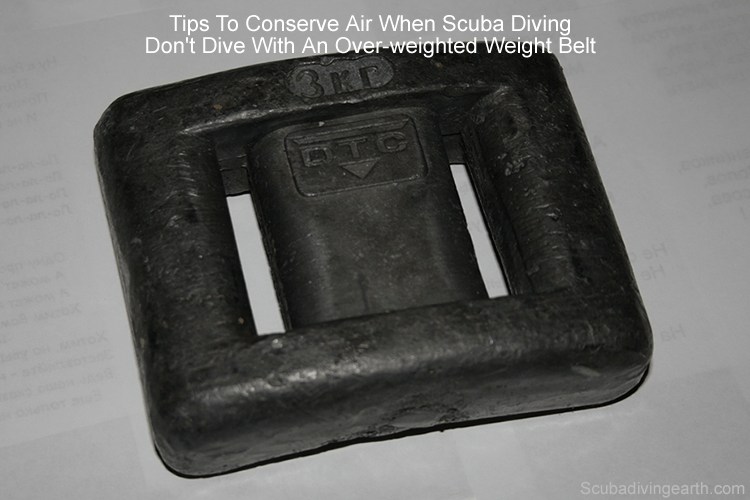
If you dive with the correct amount of weight you will consume less air and extend your dive time. Whereas if you are carrying excess weight when you dive, you’ll breathe more air and need more air to stay buoyant.
To dive more efficiently you should always dive with just the right amount of weight. The amount of weight you carry is affected by the exposure suit you wear. So the the thicker the wetsuit, the more weight you’ll need.
But also, diving with too little weight will cause you problems on your descent at the start of your dive. It will cause problems at the end of your dive, where you could ascend too quickly at the end.
Having an over-weighted weight-belt will mean you’ll have to compensate the excess weight by putting more air into your buoyancy control device to maintain neutral buoyancy.
Conclusion for air conservation tip 6: Always wear the right amount of weight on your weight belt. Never be ‘over-weighted’ on a dive or you’ll use more air to maintain neutral buoyancy. Having the correct weight will mean less air consumption and longer dive times.
12. Inflate your BCD with your own breath before leaving the boat will will conserve your air
Air diving management includes using your own breath to fill your buoyancy control device, rather than using the air from your dive tank, as this saves air before your dive begins.
This is how I have to think because of my physical size and higher air consumption. Right from the start my mind is on how I can conserve my air. Which is even before I’ve jumped into the water. So conserving your air when scuba diving starts on the boat.
Also, when you’re putting your kit together you need to check the air hose connection to your buoyancy control device. When you do so use as little air as possible, use just enough to see your equipment works and is fitted correctly.
Conclusion for conserving air when scuba diving tip 4: Use as little air as possible when checking hose connections. Plus use your own breath to fill your BCD before jumping in for your dive.
13. Control your buoyancy with small air adjustments to reduce air consumption
The art of buoyancy is all about control. Which is about mastering the use of the two air controls on your BCD. These are the air inflator (air in) and the dump valves (air in). Master your buoyancy control and you’ll conserve air and you’ll dive for longer.
Controlling your inflator hose on your BCD
The way to use less air while scuba diving is to inflate your BCD with tiny amounts of air at a time. Your buoyancy takes a few moments to correct itself, so you need to manage this carefully and slowly. By putting tiny amounts of air in each time you use just the right amount of air to correct your buoyancy.
Whereas, if you’re over zealous with your air inflation, you’ll probably over inflate your BCD. This often leads to having to dump excess air to correct the over inflation. Making this mistake uses up precious air, which is air you could use to breathe and dive for longer.
Controlling your BCD air dump valves
The only time you should be dumping air from your BCD is when you change depth or on your ascent.
When you dump air from your BCD, make sure to do so in tiny amounts to avoid dumping excess air. If you make the mistake of dumping too much air you’ll descend again. This will lead to having to compensate the error by inflating your BCD and wasting air you could be using to breathe.
Practice and be patient with your buoyancy control
Don’t get frustrated with your buoyancy if at first you can’t seem to get it right. “If at first you don’t succeed, try and try again!”
After a while, and by adopting the tips in this article, it will become natural to you. Like learning anything new, it takes practice. Be patient and over time, just like learning to walk or to ride a bike, this skill will come to you.
Conclusion for tip 9 to conserve air when scuba diving: Learn to control the amount of air you put into and dump from your BCD. This will reduce the amount of air you use to control your buoyancy while diving, leaving you with more air to breathe so you can dive for longer.
14. Be the last diver to leave the surface to delay consuming your air
If you’ve followed tip five above, you should leave your snorkel in until the very last minute. Wait a few moments for the other divers to leave the surface first.
Being last to leave the surface means you’re not left waiting for divers that faff on the surface while you’re consuming your valuable air just below them.
Conclusion for conserving air tip 12: Always be the last to leave the surface and use your snorkel to breathe until the last minute. This will extend your dive time as you started your air consumption last in the group.
15. Not emptying your BCD completely at the surface helps with air management on your dive
If you use a duck dive when you leave the surface, you won’t need to expel all the air from your BCD. This means you won’t need to add quite so much air as you descend to your dive depth to achieve neutral buoyancy, leaving more air to breathe meaning you can dive for longer.
You may need to fin a bit harder to begin your descent, but once you get below a few metres deep the density of the water will help your descent. If you are using a shot line, you can use this to pull yourself down too.
Conclusion to air conservation tip 13: By not emptying your BCD at the surface, you’ll need less air to gain neutral buoyancy at the bottom, thereby conserving air.
16. Carefully slow your descent as you approach the bottom will help conserve your air

You should inflate your BCD with small amounts of air as you approach the bottom to slow yourself down gradually so as your BCD is acting like a brake. You’ll waste valuable air if you wait until you are nearly at the bottom before pumping loads of air to slow yourself down quickly.
It’s a bit like approaching a junction in a car. As you approach the junction, you gradually apply the breaks bit by bit to arrive at the junction slowly. But if you wait to the last minute to apply your brakes, you’ll need to apply them harder and you may not even stop in time.
Conclusion for conserving air tip 14: Carefully slow your descent as you approach the bottom by inflating your BCD using small amounts of air. This approach avoids over-inflating your BCD, which is what may happen if you leave it too late, thereby conserving your air.
17. Use your lungs for buoyancy to avoid inflating your BCD and wasting valuable air (Tip comes with a warning)
WARNING: When using this technique, never hold your breath, as this is dangerous and can cause serious injury. Also, never use this technique to change depth of more than a few feet. The risk is also greater at shallower depths, as the pressure change is greater.
Your lungs represent a large buoyancy chamber. You’ll find that as your lungs fill with air you’ll become more buoyant. Whereas, as your lungs deflate you will become less buoyant.
Using your lungs carefully on a dive to adjust your depth is a common trick used by scuba divers. This avoids using you BCD to control those small ups and downs when exploring the bottom. It can also save a small amount of energy, where the alternative is to fin or use your arms.
If you want to dip down to look under a ledge or under an overhang, using this technique works well. Simply exhale air from your lungs as you manoeuvre into position. To maintain this lower position in the water, don’t use such large intakes of breath.
Conclusion for tip 15 to conserve air when scuba diving: Use your lungs as buoyancy control to avoid using your BCD air. You are naturally breathing in and out in any case, so by careful control of your breathing at certain points in your dive will help with your depth. Don’t use this technique to change depth by more than a few feet!
18. Dive shallower than the main group means you use less air than your dive buddies
When you’re diving in a group swim above the rest of the divers at a shallower depth. By doing so you are unlikely to miss much and so long as you are still within a few fin strokes of your dive buddy or the group, this is safe to do.
The depth you dive to has an impact on the amount of air you consume. The deeper you dive, the more air is consumed. Therefore the shallower you dive the less air is consumed which will lengthen your dive time.
Conclusion to tip 16 on air consumption improvement whilst scuba diving: Dive at a slightly shallower depth to the rest of your dive group, which will reduce your air consumption. Using less air will extend your dive time.
19. Swimming with the current and not against it will help conserve air when diving
Use the power of the water to save your energy when you’re diving and go with the current rather than swimming against it, as this will reduce your air consumption.
You’ll be surprised at how difficult it can be to swim against even a gentle current. So even when the current is only slight you are better off swimming with the current rather than attempting to swim against it.
Swimming with the current or diving on a drift dive is fun to do. You are pushed along with the water flow and it’s like flying. When the current is strong enough you’ll save loads of energy as you don’t have to fin at all.
Conclusion for tip 18 on how to conserve air when scuba diving: Always swim with the current as this will conserve your energy. Doing so means using less air and therefore extend your dive time.
20. Doing more diving leads to reduced air and longer dives
It’s a fact that diving more improves your air consumption. The more you dive the better your buoyancy control and the more relaxed you become. The more relaxed you are, the less energy you’ll use resulting in less air consumption so you can dive for longer.
If you’ve ever been on a liveaboard dive boat you’ll know that most dive masters use hardly any air at all. This is partly because most are extremely fit, but is also because they dive day in, day out.
Many dive masters I’ve dived with use one tank for two dives vs my two tanks. This means they are twice as efficient as me at breathing underwater.
Conclusion for tip 19 on ways to improve air consumption whilst scuba diving: Diving more improves your air consumption.
21. Losing a few extra pounds will help to improve your underwater air consumption
If you are over weight you will consume more air when diving. So if you lose weight this will improve your air consumption resulting in longer dives.
Conclusion to tip 21 on conserving air when scuba diving: Size does matter when scuba diving. The bigger you are the more oxygen your body consumes and therefore the more air you’ll breathe.
22. Trim your kit
Only take the dive equipment that’s necessary for the dive to cut down on excess weight. This will avoid excessive air consumption due to carrying more weight than is necessary.
Conclusion for tip 22 on conserving air: Review what kit you take on each dive as each extra pound or kilo you take will affect how much air you consume. Cut the weight and improve your air consumption.
The following tips are not about conserving your air but will help with extending your dive time.
Dive time extending tips
- Use your buddy’s alternative air source (Tip comes with a warning).
- Use a bigger dive tank – use a 15 litre (100 Cubic Foot) cylinder.
- Use a twin set.
- Consider switching to a rebreather.
- Check your air contents gauge when you connecting your dive tank to your regulators.
1. Use your buddy’s alternative air source (Tip comes with a warning)
WARNING: This tip or technique is not main stream and should only be done in certain circumstances. Not recommend if you’re a beginner diver or if you are not diving with someone familiar to you. Only to be done when you both have sufficient air to continue the dive. Be extra vigilant with the donors air supply and check their gauge regularly.
This tip is something I did when I dived with a female dive who used only a fraction of the air I consumed. I would air-share from her (not the other way around) and pinch some of her air to extend our joint dive time.
It helped as her alternative air source had an extended hose. This meant we could swim side by side quite easily with me using her air.
Extra safety tips if you consider using your buddy’s alternative air supply
- Be extra careful you don’t deplete the air in the dive cylinder of the dive buddy who is being ‘used’ as the host.
- The host or donor diver needs to be extra vigilant about their air consumption, as two divers are now consuming the air from the one dive tank.
- If you are diving in a group and with a dive centre, speak with the diver master beforehand to confirm they are comfortable with you doing this.
- Do not use this technique to extend your dive if your air tank is nearly empty.
- Only do this towards the beginning of the dive when you both have sufficient air to both return to the surface safely.
- You must be able to switch back to your own regulator and be able to continue the dive safely.
Conclusion for tip 24 on extending dive time: Sharing your buddy’s air by using their alternative air supply will extend your dive. This tip only works where there’s a significant difference between two buddies air consumption.
2. Use a bigger dive tank such as a 15 litre (100 Cubic Foot) cylinder
Having a larger dive tank is a useful technique for those scuba divers who are struggling with air consumption. But be aware a 15 litre tank is much heavier and more cumbersome than a 12 litre tank.
A 15 litre (100 cubic foot cylinder) dive tank is 27% larger than the more common 12 litre (80 cubic foot cylinder) dive tank.
Important extra considerations when using a 15 litre (100 cubic foot) dive tank
- Larger dive tanks are heavier.
- You’ll need to adjust your buoyancy as you’ll need less weight.
- 15 litre dive tanks are more cumbersome when moving about a dive boat.
- If you have to walk up a ladder to the dive boat a 15 litre tank makes this more of a challenge.
- It’s not always easy to get 15 litre (100 Cu Ft) dive tanks on scuba diving boats.
- Most liveaboards in the Red Sea I’ve dived with, they’ve all had 15 litre (100 Cu Ft) cylinders. But in all the times I’ve dived in the Caribbean, most dive operators don’t seem to use or have them.
Conclusion to tip 25 regarding extending the dive time of scuba dive: Change your dive tank for a larger 15 litre (100 Cu Ft) will increase the amount of air you have and therefore extend your dive time.
3. Use a twin-set to increase how much air you take on your dive
As with adopting a larger tank if you add an extra dive tank on your back, you double the amount of air you have to breathe when you dive.
Twin-set dive cylinders tends to be used more for deeper diving. But even if you’re not going extremely deep, having a twin set of dive tanks will help.
Having two 12 litre dive tanks on your bank means there are weight and buoyancy issues to consider. The additional consideration of twin-set-cylinders is that it does require the addition of more scuba equipment
Conclusion to tip 26 on increasing your dive time – Double your dive tank air capacity by upgrading to twin-set dive tanks. With twice the air capacity your dive time will be extended. This is not recommended for beginner divers, but is a good idea for larger scuba divers.
4. Consider switching to a rebreather
The concept of a rebreather works differently to a normal open air system.
There are many pros and cons to a rebreather, which includes cost, maintenance and potential danger in using them. Many improvements have been made on the design of rebreathers and it’s not something I’ve personally used.
Conclusion to tip 27 on extending dive time when scuba diving: Consider investing in a rebreather to extend your dive time significantly. However, you still have the other constraints to contend with when you dive. For example, you will still have to consider depth and decompression.
5. Check your air contents gauge before you dive to make sure you have a full tank
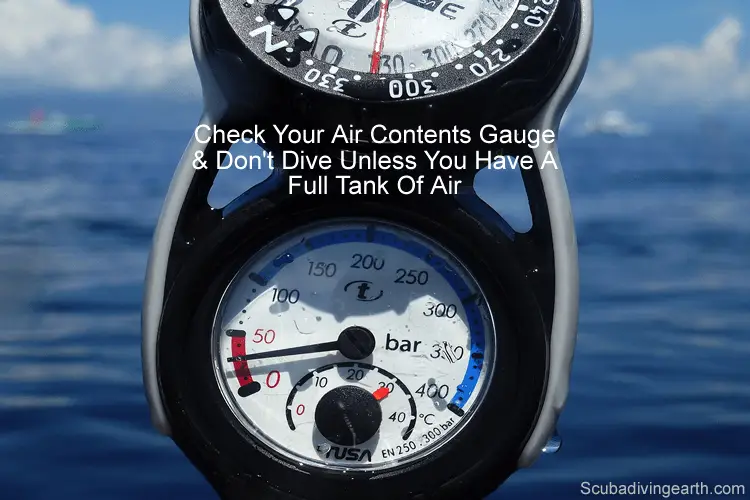
When you first connect your regulators to your dive tank you should check your contents gauge. This check serves two main purposes:
- To make sure your regulators are in good working order.
- To check the air contents of the diving tank.
If the contents are lower than what’s expected (i.e. under 210-220 bar) change the tank for a new one. If you start your dive on a dive tank that’s less than full your dive time is shortened right from the start.
More Reading: Do empty scuba tanks float? (This depends on the material they are made from)
Conclusion for dive time extension tip 28: Check your dive tank contents when you first connect your regulator to make sure you start your dive with as much air as possible.
Your sex plays a role in scuba diver air consumption as women consume less air
There’s a difference between the amount of air that men consume vs the amount of air that women consume when scuba diving. This is important when pairing up as dive buddies. But of course if you’re a couple and you want to dive together no matter what the difference in air consumption, then no problem.
More Reading: How do I get a dive buddy? (5 easy ways to find a dive buddy)
This often isn’t a problem when diving in a group and the dive master allows you to remain with the rest of the group if your buddy is low on air and is sent to the surface.
Consider the difference between the rate of air consumption between males and females when choosing a buddy to dive with. Women tend to be more efficient with their air consumption underwater.
What happens if you hold your breath while scuba diving?
Holding your breath while scuba diving is extremely dangerous. It’s so dangerous that by doing so could actually lead to death in the worst case.
The main principle to understand is air expansion underwater versus the water pressure changes at the depth of water, which is explained using Boyles Law.
What is the purpose of skip breathing?
Skip breathing is the method of holding your breath each time you inhale. The understanding is that by breathing like this the lungs will be more efficient at extracting oxygen from the air in your lungs.
Skip breathing was originally thought to extend air time of an air cylinder, but there’s no evidence to support this theory.
The research shows that by using the skip-breathing method there will be a build up of carbon dioxide in the blood stream, which in turn will lead to an increased heart rate and respiration. The result of this will actually shorten your air time, rather than increase it.
As a word of warning, skip breathing is not recommended for scuba divers. In fact, I would positively advise against doing it. Because not only is there no evidence that it works (in fact the evidence is to the contrary), this could be dangerous for you to do.
I hope you enjoyed this article about tips to conserve air when scuba diving
I’d love to hear from you. Tell us about your adventures of diving and snorkeling, in the comments below. Please also share your photos. Either from your underwater cameras or videos from your waterproof Gopro’s!
If this article hasn’t answered all of your questions. If you have more questions either about snorkeling or scuba diving (or specifically about conserving air when scuba diving), please comment below with your questions.
There will also be many more articles about scuba diving (and snorkeling) for you to read and learn about these fabulous sports.
Have fun and be safe!

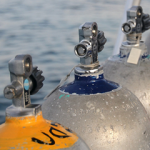
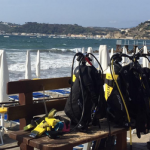



great post alot of good information here
Thank you for your comment – these tips have been built-up from years of scuba diving!